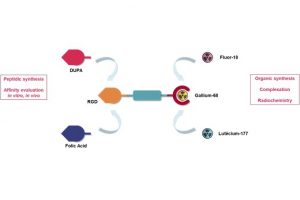PhD Proposal at University of Lorraine – Design of a selective universal radiolabeling agent for PET imaging and radionuclide therapy
Description of the subject
Molecular imaging, in particular positron emission tomography (β+) imaging (PET), has become essential for the diagnosis of many diseases such as cancers. The rise of this non-invasive technique is linked to the obtaining of three-dimensional images, after radiotracer injection, allowing the localization and quantification of pathology-specific targets. Radiotracers are also used for the cancer treatment by targeted radionuclide radiotherapy (TRT). These radiotracers mainly combine a targeting agent, interacting with a pathology biomarker, and a radionuclide chelating agent allowing image recording. Recently a new fluorine-18 radiolabeling method enabled by aluminum complexation has emerged and has become a technique of choice for the development of new radiotracers. Depending on the nature of the chelating agents, different radionuclides can be complexed by the tracers. Fluorine-18 (18F) and gallium-68 (68Ga) are the radionuclides of choice for PET imaging and lutetium-177 (177Lu) for TRT, but these three radionuclides have different complexing properties. Thus, aluminum-fluorine-18 can be complexed by HBED-CC and NOTA chelating agents, gallium-68 by HBED-CC, NOTA and DOTA chelating agents and lutetium-177 by DOTA chelating agent.
The objective of this thesis work is to optimize the chemical structure of a new bifunctional chelating agent (BCA), developed during a previous PhD thesis, that can be (i) radiolabeled with aluminum-fluorine-18, gallium-68 and lutetium-177 by coordination chemistry, and (ii) coupled to targeting peptides by bioconjugation. The aim is to prepare a precursor of labeling, composed of a chelator coupled to a targeting agent, that can be used in PET imaging and TRT for theranostic application (therapy + diagnosis) as part of the personalized medicine approach.
 Required profile
Required profile
To develop this research program, we are looking for a serious, curious and motivated candidate to be strongly involved in this doctoral project. He (she) should have solid knowledge in organic synthesis and characterizations with excellent theoretical and experimental skills. He (she) must have a great capacity for work with a strong motivation to get involved in this interdisciplinary project. Without necessarily having the required experience, he (she) will have to show an attraction for the mentioned fields of application and an interest in in vitro/in vivo evaluating of the synthesized compounds, also good communication skills and a taste for teamwork.
The candidate must have a master’s degree (or equivalent) in chemistry. All applicants to the Doctoral School SIMPPÉ must have successfully completed a Master degree or its equivalent with a grade comparable to or better than the French grade AB (corresponding roughly to the upper half of a graduating class).
In all cases (French or foreign Master degree, engineering degree, etc.) the counsel of the doctoral school will examine the candidate’s dossier, which must include:
- CV and letter of motivation,
- the grades obtained for the Master (or equivalent) degree and a copy of the diploma if it is available,
- 2 letters of recommendation, preferably from the director of the Master program and the supervisor of the candidate’s research project,
- written material (publications, Master thesis or report, etc.) related to the candidate’s research project.
Establishment and laboratory
The PhD student will work at the LCPM laboratory of the University of Lorraine and Nancyclotep platform located at CHRU Brabois Hospital in Nancy.
Candidates should send the required documents to Dr Samir Acherar (PhD supervisor) and Dr Charlotte Collet (PhD co-supervisor) before 15 June.
Contacts: samir.acherar@univ-lorraine.fr and charlotte.collet@univ-lorraine.fr.
 FLI
FLI
